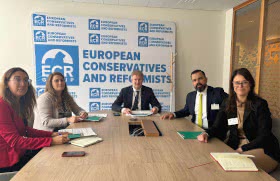
In Europe, the rail freight transport sector
he is going through serious difficulties. The director underlined this
General of the Fermerci Association, Giuseppe Rizzi, in a meeting
which took place yesterday in Brussels with MEPs Carlo Fidanza and
Flavio Tosi, the latter rapporteur for the Transport Directive
arranged. "European rail freight transport - said
explained Rizzi - is in a continuous storm: constraints of
capacity, backlog in maintenance, widespread construction sites,
Poor cross-border coordination and new access requirements
to the Swiss rail network, undermine the competitiveness of the
sector, with the real risk of a retreat towards the
exclusively road transport mode. Especially

- specified the general manager of the Fermerci Association -
in the Alpine corridors and on the Italy-France and Italy-Switzerland axis, the
interruptions have already shown dramatic effects, such as
demonstrated by the closures of the Modane and Gotthard passes to
following the landslide and accident that occurred in 2023. To this
added to this is the complex German situation, which sees in perspective
from 2027 to 2030 complete closures for 40 lines
railway services up to five months each and recent interventions
regulations issued by the Federal Office of Transport of the
Swiss Confederation that will cause the blocking of traffic
of a large part of the wagon fleet currently circulating"
In addition, Rizzi pointed out that, while in Italy the critical issues
related to the infrastructure transition caused by the implementation of the
PNRR works will most likely end at the end of 2026, in
Germany, Italy's main logistics-rail partner,
2026 to 2030, rail disruptions will increase dramatically
due to network modernisation works. Rizzi
noted that this is a very critical future scenario and
impossible to sustain for all companies in the logistics sector
railway, national and international.
Noting that the Italian infrastructure manager is
by all available means - wide openness to the
comparison and coordination with companies and other network operators -
critical phase for the sector, Rizzi explained that the same
does not apply to other countries: "without an integrated approach,
international coordination, adequate funding and
Common rules, the rail freight sector risks losing
further capacity and competitiveness".
On the occasion of the meeting, Fermerci also reiterated its
need for a balanced revision of the Directive
on combined transport that takes into account differences in
competitiveness between Member States and adequate
regulation of the Weights and Dimensions Directive, so that it does not
widen the gap with the railways in favour of transport on
rubber.